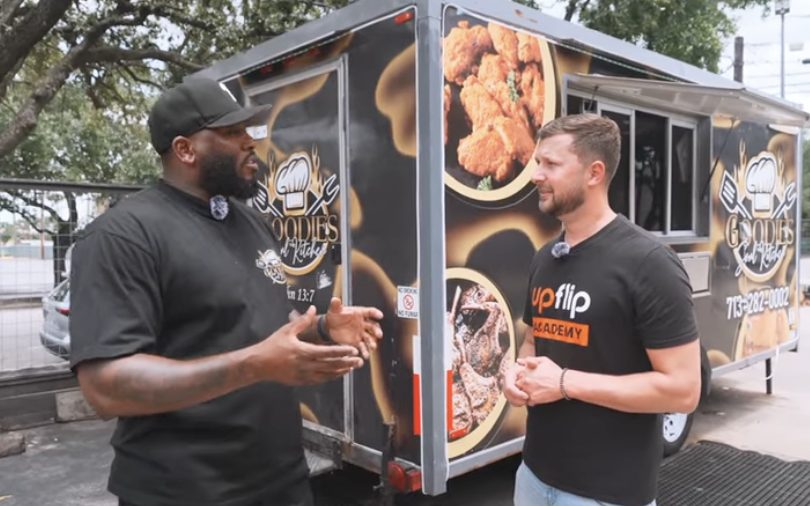The food truck industry has always fascinated me, but what Daewon’s story reveals about building a successful food truck business in just seven months is nothing short of remarkable. Starting with minimal experience and a thousand-dollar investment, he’s now pulling in $22,000 weekly with only ten hours of personal time invested. That’s an astounding $2,200 per hour of his time.
What makes this story particularly compelling isn’t just the financial success, but how it demonstrates that with the right strategy, you don’t need culinary training or extensive restaurant experience to succeed in the food industry.
Finding the Right Niche: Late-Night Soul Food
The first lesson from Daewon’s success is the importance of identifying a market gap. His food truck, Goody Soul Kitchen, stands out as “the only late-night soul food spot in America.” By serving lamb chops, fried chicken, fried catfish, and soul food sides after midnight, he tapped into an unmet need.
This strategic positioning eliminated direct competition and allowed for premium pricing. With an average ticket price of $28-30, his food truck commands higher prices than most, justified by the unique late-night timing and downtown location near clubs and entertainment venues.
Smart Startup Strategy: Minimizing Initial Investment
What impressed me most was Daewon’s approach to startup costs. Rather than spending $60,000-80,000 on a new food truck, he:
- Used Clicklease to finance a $43,000 trailer with just a $1,000 down payment
- Secured a $5,000 business credit card for food purchases
- Prioritized marketing over equipment in his initial budget
- Choose a trailer over a food truck for operational flexibility
This trailer-based approach provides a crucial advantage: if his towing vehicle breaks down, he can rent another one and keep operating. With a traditional food truck, mechanical issues would meana complete business shutdown.
The Power of Preparation and Systems
Daewon’s operation runs efficiently because of the systems he has implemented. The business follows a clear weekly schedule:
- Monday/Tuesday: Shopping at Restaurant Depot ($3,000-4,000 weekly)
- Tuesday/Wednesday: One full day of food prep (8-9 hours)
- Thursday-Sunday: Operating the food truck
By dedicating one full day to prep everything for the week, his team avoids burnout and ensures consistent quality. This preparation system enables them to serve fresh soul food within five minutes of ordering—a critical factor in the food truck business, where customers often prefer not to wait.
The Marketing Playbook Anyone Can Copy
Daewon’s marketing approach is refreshingly straightforward and cost-effective. With just $200 per week allocated to marketing, he has built an operation generating $80,000 per month. His strategy includes:
1. Building anticipation through a proper “rollout” before opening
2. Hosting a tasting event for content creators to generate buzz
3. Conducting professional food photoshoots for social media content
4. Posting on social media four times daily, with one “master reel” on Thursdays to drive weekend traffic
5. Running targeted Instagram ads for as little as $5 per day
6. Maintaining a consistent location to build Google search presence
The consistency of location is particularly interesting. While most food trucks move around, Daewon stays put, paying $1,500 monthly for his spot. This fosters customer loyalty and builds anticipation, as they’re only open Thursday through Sunday.
The Turning Point: Bringing in Professional Help
After three months of “chaos” and “failing, failing, failing,” Daewon made a crucial decision that transformed his business: hiring a professional consultant chef. This consultant:
- Created standardized recipe books
- Trained staff on proper procedures
- Established cleaning protocols
- Streamlined operations
This investment in expertise enabled Daewon to step away from daily operations and focus on business growth. Now he works just ten hours weekly while his team handles the rest.
Lessons for Aspiring Food Truck Entrepreneurs
The biggest mistake Daewon sees new food truck owners make is “working in the business instead of on the business.” Many owners believe they need to cook every day, which prevents them from scaling back.
His advice is clear: decide whether you want to be a cook or a business owner. If it’s the latter, focus on systems, delegation, and consistent customer experience.
What’s particularly inspiring about this story is that Daewon came from a challenging background with limited support. He attributes his success not to fear of failure but to his ability to operate independently and build something without needing constant validation.
For those looking to follow in his footsteps, remember that the food truck business is actually more complicated than running a restaurant in many ways. It requires managing multiple locations (prep kitchen, storage, and truck) and coordinating many moving parts.
But with the right strategy, systems, and team, it can be an incredibly profitable venture with relatively low startup costs. Daewon’s success proves that with smart positioning, efficient operations, and strategic marketing, a food truck can become a thriving business in just a matter of months.
Frequently Asked Questions
Q: How much does it cost to start a food truck business?
While traditional food trucks can cost $60,000-80,000, Daewon started with just a $1,000 down payment on a $43,000 trailer using Clicklease financing. Additional costs included $5,000 for initial food inventory (financed through a business credit card) and marketing expenses. The total startup investment was significantly lower than most food truck operations because he focused on financing rather than paying cash upfront.
Q: Do you need culinary experience to run a successful food truck?
No, Daewon had no background in food or kitchen experience when he started. The key is hiring the right chef and consultant to develop recipes and train staff. Daewon focused on the business aspects while delegating the culinary responsibilities to professionals. This approach enabled him to succeed despite having no prior experience in the food industry.
Q: Why choose a trailer over a traditional food truck?
A trailer offers more operational flexibility than a traditional food truck. If the towing vehicle breaks down, you can rent an alternative vehicle and continue operations. With an integrated food truck, mechanical issues with the vehicle mean the entire business must shut down until repairs are complete. This separation of vehicle and kitchen space provides important business continuity.
Q: How important is location for a food truck business?
Location is critical. Unlike many food trucks that move around, Daewon found success by maintaining a consistent location near nightlife areas. This allowed customers to see him reliably and built anticipation, as they were only open on Thursday through Sunday. He recommends avoiding food truck parks due to saturation and competition, instead seeking partnerships with bars or venues that might offer free space in exchange for providing food service to their customers.
Q: What marketing strategies work best for new food trucks?
Daewon’s success came from consistent social media marketing rather than expensive advertising. His approach included professional food photography, daily social media posts, strategic video content timed to drive weekend traffic, and targeted Instagram ads costing just $5 per day. He also created anticipation through a proper “rollout” period before opening and hosted a tasting event for content creators to generate initial buzz and reviews.







